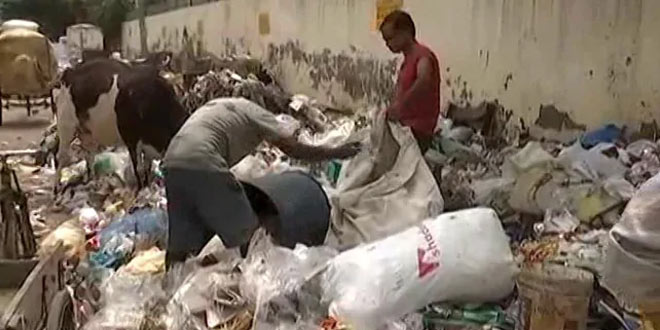Highlights
- Sanitation workers to receive skill training under GARIMA scheme
- The scheme will be implemented in all urban local bodies of Odisha
- The scheme will provide personal protective gears to sanitation workers
Bhubaneswar: Chief Minister Naveen Patnaik on Friday launched “GARIMA” a new Scheme to ensure Safety and Dignity of Core Sanitation Workers of the State. Under this scheme, about 20,000 core sanitation workers and their families covering one lakh population are likely to be benefitted. A dedicated corpus fund initially with Rs. 50 crore will also be created, a State Commission for Core Sanitation Workers will also be constituted, the Scheme will be implemented in all the 114 Urban Local Bodies (ULBs) of Odisha.
While launching the scheme to eliminate manual scavenging, Chief Minister Patnaik said,
In spite of the nation making several strides in various sectors competing with the best in the world, these underprivileged people were made to render this invaluable service to the society for generations, deprived of safety, dignity and a decent livelihood, apart from suffering social stigma and exclusion. Our conscience can never be calmed if we don’t take steps to correct this injustice. My government has therefore decided to launch a scheme called “GARIMA”, a Scheme to ensure Safety and Dignity of Core Sanitation Workers.
Speaking on the occasion, Minister for Housing and Urban Development Pratap Jena said the scheme is first of its kind by any state in India to provide a comprehensive package- institutionalising and regulating the core sanitation services, providing service level benefits, social security and financial benefits to core sanitation workers and their families.
The scheme also brings an increased focus on enforcement of statutory provisions under various national and state legislations. Approximately, 20,000 core sanitation workers and their families with about 1 Lakh population will be benefitted from the scheme, Mr. Jena said.
The scheme aims to identify through state-wide survey and register core sanitation workers, mandates registration of sanitation service providers, ensures provision of necessary machines and appropriate PPEs (personal protection equipments) to ensure safe working conditions.
Also Read: Over 46,000 ASHAs In Odisha Working Closely With Local Communities To Fight COVID-19
All core sanitation workers will receive skilling and training to improve their skills. Additionally, they will have access to counselling support to acquire new skills and financial support if they choose an alternative livelihood, if they wish so.
Some of the benefits include the introduction of special category of wages for core sanitation work, introduction of Risk& Hardship allowance, financial assistance to the families in the event of accident or injury, financial support in the form of House Grant and purchase of two wheelers to the extent of 90 per cent of the cost.
In addition to this, access to EPF, retirement benefits, post service benefits and illness allowance will provide further financial security to the core sanitation workers and their families.
The Government of Odisha will also provide welfare benefits like health and life insurance, disability support, periodic health check-ups, housing, educational support, mobility support and mobile support.
Also Read: Sero Survey: Antibody Prevalence Rate Of A Low 5.15 Per Cent Reported In Odisha’s Bhubaneswar
(Except for the headline, this story has not been edited by NDTV staff and is published from a syndicated feed.)
NDTV – Dettol Banega Swasth India campaign is an extension of the five-year-old Banega Swachh India initiative helmed by Campaign Ambassador Amitabh Bachchan. It aims to spread awareness about critical health issues facing the country. In wake of the current COVID-19 pandemic, the need for WASH (Water, Sanitation and Hygiene) is reaffirmed as handwashing is one of the ways to prevent Coronavirus infection and other diseases. The campaign highlights the importance of nutrition and healthcare for women and children to prevent maternal and child mortality, fight malnutrition, stunting, wasting, anaemia and disease prevention through vaccines. Importance of programmes like Public Distribution System (PDS), Mid-day Meal Scheme, POSHAN Abhiyan and the role of Aganwadis and ASHA workers are also covered. Only a Swachh or clean India where toilets are used and open defecation free (ODF) status achieved as part of the Swachh Bharat Abhiyan launched by Prime Minister Narendra Modi in 2014, can eradicate diseases like diahorrea and become a Swasth or healthy India. The campaign will continue to cover issues like air pollution, waste management, plastic ban, manual scavenging and sanitation workers and menstrual hygiene.
[corona_data_new]



























